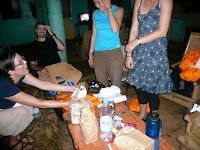There was a national campaign to vaccinate vulnerable populations against meningitis A this month in Senegal and I was able to go out with teams on several of the vaccination days. It was almost exactly like the Yellow Fever Vaccination Campaign that happened earlier this year, which went really well. I like participating' it's interesting to see how it all rolls out, it's great to get out into the bush and see new villages, and it's reassuring that big vaccination campaigns like this happen on a regular basis.
I'm not a nurse or doctor or even an EMT, so pretty much all I did was fill out the little pink proof-of-vaccination cards. The Health Center staff knows that PCVs can write quickly and are generally pretty efficient when it comes to things like setting up a vaccination site and making sure everything proceeds in a relatively orderly fashion, so on all the days that I went out with vaccination teams that was what I did. We filled out hundreds and hundreds of little cards (location, name, age, date, vaccine lot number, expiration date, closest health structure), made our best guess when it came to a lot of the ages, and ran through a little spiel about meningitis more times than I can remember.
There are always challenges - the vaccine must be kept cold, things tend to run late, some people are afraid of needles, it's hard to fuel up the trucks when the nearest gas station is 50 miles away, there are stock shortages, people are speaking Wolof and French and Puular and Malinke and Jahonke and Bassari all at once - but the health workers do am impressive job of keeping it all together.
Ndiaye, the nurse who was our team leader, is an extremely calm and professional person, and the Red Cross Youth volunteers were helpful. Overall it was a great vaccination campaign and it's nice to know that the vaccine lasts 10 years.
 |
| Vaccination Time! |

























.jpg)
























